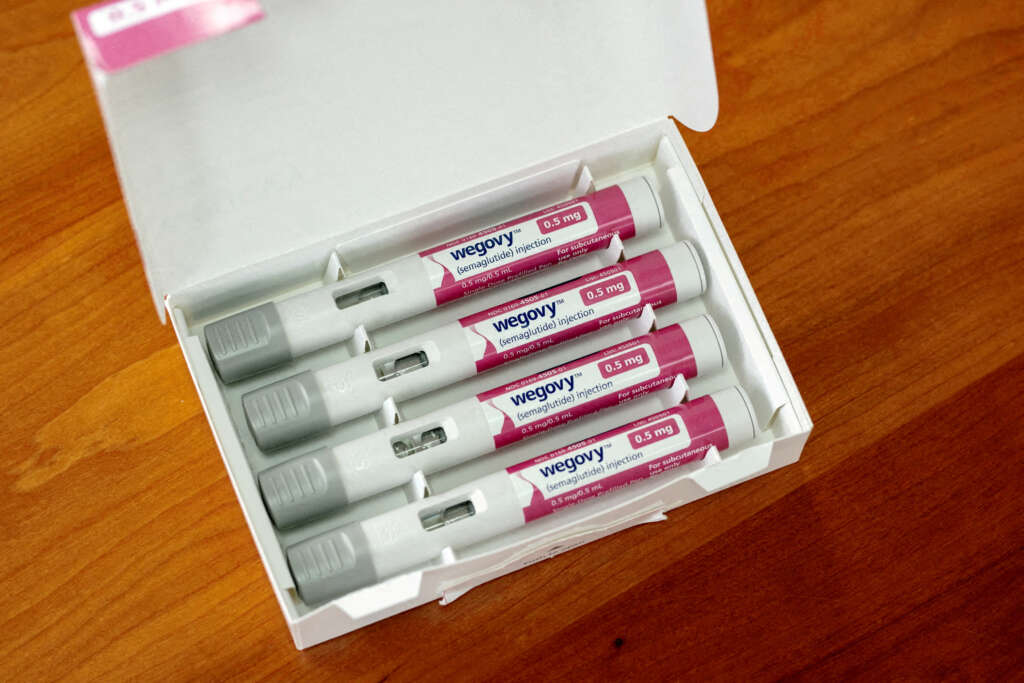
Analysis-Europe faces long wait for weight-loss drugs as governments eye costs
By Ludwig Burger and Andreas Rinke
FRANKFURT (Reuters) – Novo Nordisk will start selling its hugely popular obesity drug Wegovy in Germany this month, its third European market, but only people who pay from their own pocket or have certain private health insurance plans will be able to get it.
A decades-old German law bans public health insurance schemes from paying for weight-loss drugs, categorising them alongside pills for impotency or baldness as a lifestyle choice rather than a health necessity.
That means the cost of Wegovy, which has a U.S. list price of $1,350 a month, will not be reimbursed for the 90% of Germans covered by such plans. Novo has yet to set a price for Wegovy in Germany, Europe’s largest pharma market.
Germany’s stance on weight-loss drugs is among the region’s strictest, even though the proportion of its citizens who are overweight is above the European Union average.
It highlights the challenge Novo and rivals face in convincing European governments to pay for obesity drugs, which analysts say is likely to slow their take-up there.
Some doctors argue that Wegovy could help stem a tide of weight-related conditions such as heart disease or joint pain that are themselves costly to treat.
Martin Merkel, a medical professor and member of the German Endocrinology Society, said the drug offered a “very, very good opportunity” to reduce weight and prevent follow-on disease.
“How many knees would not have to be operated on if we were all slimmer?” said Merkel, adding that pushing diet and exercise alone has shown limited success.
Other researchers, including dietician and senior lecturer Duane Mellor of Aston University in Birmingham, England, say promoting a healthier lifestyle should take precedence over prescription drugs.
SLOWER THAN EXPECTED
Production problems and a struggle to keep up with overwhelming U.S. demand have already led to a slower-than-expected roll out of Wegovy in Europe.
Novo boss Lars Fruergaard Jorgensen said in a newspaper interview on June 24 that the Danish company would launch the drug in Germany at the end of July.
Germany’s health ministry told Reuters there were no plans to change the law to cover weight loss drugs.
One lawmaker in Berlin cited concerns about the cost weighing on an over-stretched health budget. The lawmaker, who did not want to be named, said expert panels governing reimbursement would review any benefits of the drugs beyond just weight loss, the usual system for approvals.
Michael Wirtz, who represents patients at advocacy group Obesity Help Germany, says this is short-sighted. Weight-loss drugs could prolong lives and help people stay in the workforce.
“This is not about people needing to be lean and attractive,” he said.
Germany is not the only government to impose limits.
Public health insurance schemes in Norway and Denmark, the other two European countries where Wegovy is available, will not pay for the drug, arguing that monthly costs of between $160 and $350 are too high compared to the benefits.
Denmark’s largest private health insurer will also stop paying for it next year due to high demand.
French payment schemes will only cover its use for treating very obese people with a body mass index (BMI) of 35 or over, a higher minimum than European regulators indicated when they approved the drug in January 2022.
Access in Britain will initially be through hospital specialists and limited to people with a BMI of 35 or over. The government plans to authorise family doctors to prescribe the drug only after a two-year pilot scheme.
DIFFERENT PICTURE
In the United States, the federal Medicare health plan for older Americans is prohibited from covering weight-loss drugs.
Many health plans paid for by large employers will cover Wegovy, although they may require that patients try a rigorous diet programme or cheaper drugs first.
“In Europe and the rest of the world, there is going to be much more variability,” said Terence McManus, fund manager at Switzerland-based Bellevue Asset Management.
Barclays analysts estimate the global market for obesity drugs will increase to more than $60 billion by 2030 from $2.9 billion in 2022, about 60% of which will be in the United States and around 26% in the European Union.
At present, around 53% of people across the 27-country EU are overweight or obese compared with roughly 74% in the United States, although the EU statistics office has warned that weight problems are rapidly increasing in most member states.
But for Europe’s mostly universal health schemes, a surge in costs is a bigger fear than a rise in weight-related problems over time, said Phil McEwan, CEO of health economics consultancy Heor in Cardiff, Wales, who advises Novo on market access.
“There are many more morbidly obese people in the U.S.. You could argue they’ve got more to gain,” said McEwan.
(Additional reporting by Patricia Weiss in Frankfurt; Editing by Josephine Mason and Catherine Evans)


